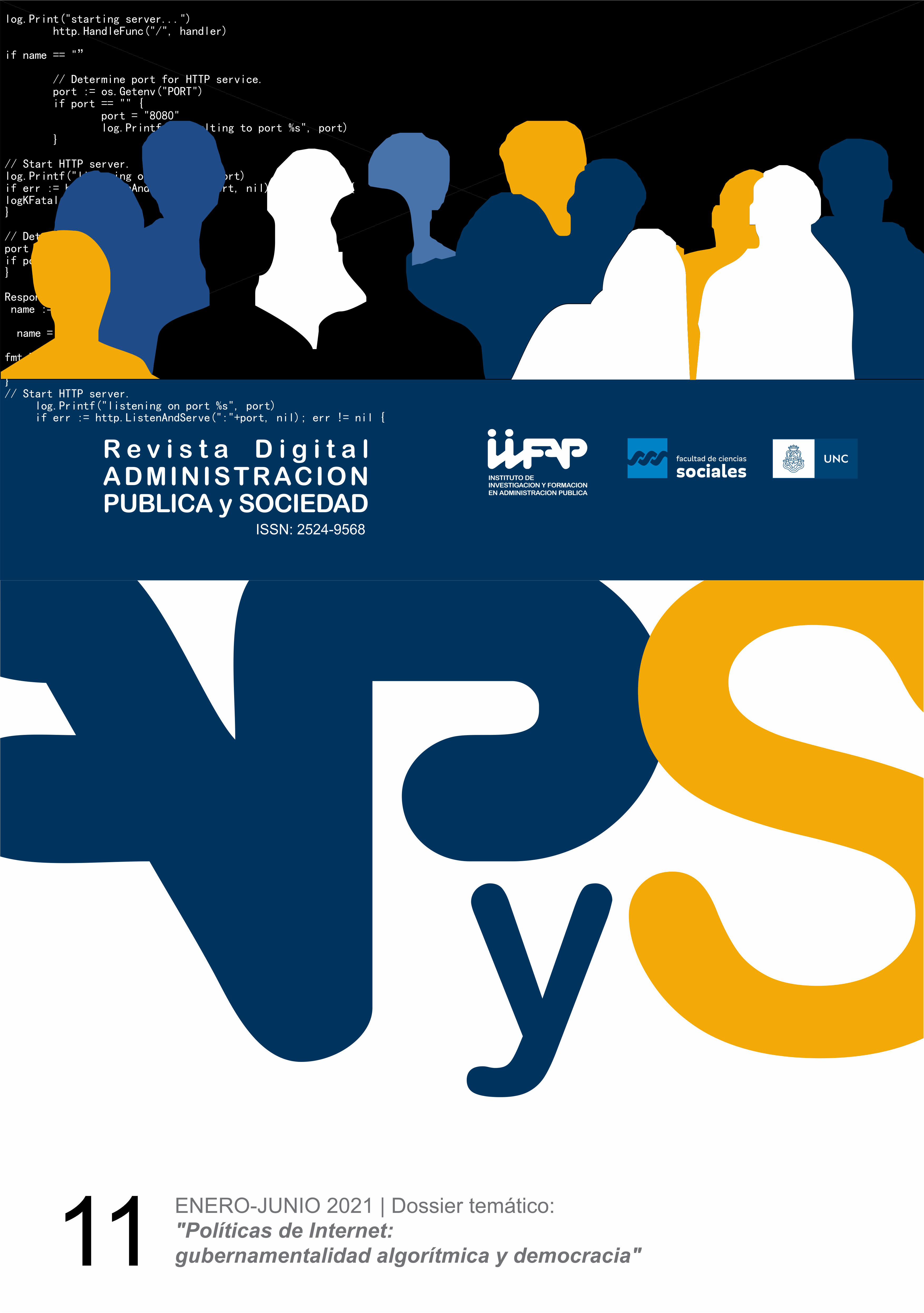Governmentality, data and algorithms. The modernization of the Argentine State under the model of digital platforms
Main Article Content
Abstract
This paper aims to analyze the implementation of the Digital Platform of the National Public Sector carried out by the government of Argentina between 2017 and 2019. This commitment is based on the implementation of a modernization process of the State. This emerging style of government action derives from a computationally assisted management and organization system of society, culture and economy that is called a “platform”: a programmable architecture designed to organize the interactions between users and machines.
The approach adopted for this study refers to the perspective of governmentality derived from the analytics proposed by Michel Foucault and the post-Foucaultian anglophone tradition. The gaze that is sharpened in this approach is the government's analytics, through statements and practices that allow us to recognize the conditions in which particular entities or regimes of government practices emerge, remain, and mutate.
This commitment recognizes the relevance assumed by the data and its processing as it allows the coordination and implementation of public policies and the generation and analysis of information on multiple aspects of each citizen. But for the development of this art of government requires a technical knowledge whose operation requires establishing exchanges with technology actors.
This work strives to single out the forms and practices of government assisted by computational technologies and how this leads to a reconfiguration of the State and mutations in the way the public and citizen subjectivity is configured.
Article Details

This work is licensed under a Creative Commons Attribution-NonCommercial-ShareAlike 4.0 International License.
Authors who publish in this journal accept the following terms of the copyright policy:
- Authors shall retain their copyright (including copyrights) and shall grant to the journal the right of first publication of their work, which shall simultaneously be subject to the Creative Commons Recognition License: No commercial use of the original work or any derivative works is permitted, distribution of which must be made under a license equal to that which governs the original work.
- Authors may adopt other non-exclusive license agreements for the distribution of the version of the published work (e.g., placing it in an institutional repository or publishing it in a book) provided that the initial publication in this journal is indicated.
- Authors are allowed and encouraged to disseminate their work through the Internet (e.g., in institutional repositories or on their website) after the publication process, which may lead to interesting exchanges and increased citations of the published work. (See The Effect of Open Access).
How to Cite
References
BARRY, Andrew (2001). Political machines: Governing a technological society. Londres: The Athlone Press.
BORRMANN, R., IGLESIAS, Gonzalo, SAMPIETRO, Natalia, BENASSI, A., MIGUEL, Agustín, BENÍTEZ, Romina, y PÉREZ, Delfina (2019). Abrir Datos. Claves de una política de apertura. Buenos Aires. Buenos Aires: Ministerio de Modernización de la República Argentina. Consultado en https://www.argentina.gob.ar/sites/default/files/datos_-_brochure_datos_abiertos.pdf
BRETON, Philippe (2000). La utopía de la comunicación. Buenos Aires: Nueva visión.
CASTRO GÓMEZ, Santiago (2007). “Michel Foucault y la colonialidad del poder”. En Tábula Rasa. Nº.6: [pp.153-172]. Bogotá.
DEAN, Mitchell (2010). Governmentality. Power and rule in modern societies. Londres: Sage Publications.
DELANDA, Manuel (1991). War in the Age of Intelligent Machines. New York: Zone Books.
DELEUZE, Gilles (2007). Pintura. El concepto de diagrama. Buenos Aires: Cactus.
FOUCAULT, Michel (1985). Saber y Verdad. Madrid: La Piqueta.
FOUCAULT, Michel (1999). Estética, Ética y Hermenéutica. Barcelona: Paidós Ibérica.
FOUCAULT, Michel (2013). De gouvernement des vivants. Cours au Collège de France, 1979-1980. París: Seuil/ Gallimard.
FOUCAULT, Michel (2014). Vigilar y castigar. Buenos Aires: Siglo XXI.
GOOGLE LLC (2019). Condiciones del Servicio de Google Analytics. Estados Unidos.
OHM, Paul (2010) “Broken promises of privacy: responding to the surprising failure of anonymization”. En UCLA Law Review, Vol. 57, Pag 1701. Recuperado de https://www.uclalawreview.org/pdf/57-6-3.pdf?source=post_page
IGLESIAS, Gonzalo, SAMPIETRO, Natalia, RASPO, Carolina, MAYORA, Pilar,
PARNOFIELLO, Marisol, TISCHIK, María S., BENTRON, Vanesa y ROMÁN, Claudia (2018). Kit de Datos Abiertos. Buenos Aires: Ministerio de Modernización de la República Argentina. Recuperado de https://www.argentina.gob.ar/sites/default/files/2._kit_de_datos_abiertos.pdf
RODRÍGUEZ, Pablo (2019). Las palabras en las cosas. Saber, poder y subjetivación entre algoritmos y biomoléculas. Buenos Aires: Cactus.
LAFLEUR, Sylvain (2015). “Foucault, la communication et les dispositifs”. En Communication, 33 (vol. 33/2). https://doi.org/10.4000/communication.5727
LATOUR, Bruno (2008). Reemsablar lo social una introducción a la teoría del actor red. Buenos Aires: Manantial.
OCDE (2019). Digital Government Review of Argentina. Paris: OECD. https://doi.org/10.1787/354732cc-en
RIEDER, Bernard (2017). “Beyond Surveillance: How Do Markets and Algorithms ‘Think’?. Le Foucaldien, 3(1), 8. https://doi.org/10.16995/lefou.30
SADIN, Éric (2018). La humanidad aumentada. Administración digital del mundo. Buenos Aires: Caja Negra.
SRNICEK, Nick (2018). Capitalismo de Plataformas. Buenos Aires: Caja Negra.
TIQQUN, Colectivo (2013). La hipótesis cibernética. Recuperado en http://tiqqunim. blogspot. com/2013/01/la-hipotesis-cibernetica. html.
VAN DIJCK, José (2016). La cultura de la conectividad. Una historia de las redes sociales. Buenos Aires: Siglo XXI.
VAN DIJCK, José, POELL, Thomas, y DE Waal, Martjin (2018). The Platform Society. Public values in a connective world. Oxford: Oxford University Press.
VANNINI, Pablo (2019). “Capitalismo cognitivo y plataformas, una mirada desde la economía social”. Revista Idelcoop, 2019, vol. 228, p. 11-19.
ZUBOFF, Shoshana (2015). “Big Other: Survillance Capitalism and Prospectes of an Information Civilization”. Journal of Information Technology, (30), 75–89. https://doi.org/10.1057/jit.2015.5
ZUBOFF, Shoshana (2019). The age of surveillance capitalism: the fight for a human future at the new frontier of power. New York: PublicAffairs.
ZUKERFELD, Mariano (2020). “Bits, plataformas y autómatas. Las tendencias del trabajo en el capitalismo informacional”. Revista Latinoamericana de Antropología del Trabajo, vol. 4, no 7.

